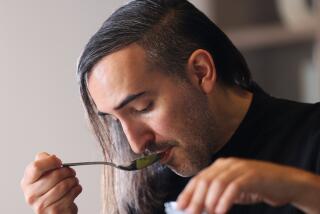âBollywood Kitchenâ is theater that lets you to cook, and dance, along
Chicken curry is bubbling on the stove. The rich scent of garlic, ginger, coriander and Indian chili powder fills the air. Check the basmati rice. Itâs almost done. Take a sip of your Mumbai Mule â feel that vodka kick? Now, turn your attention back to your laptop screen. Sri Rao has something important to say.
He stands by his stove in New Yorkâs Hellâs Kitchen, wearing a smart suit jacket and a collared shirt with no tie. Heâs cooking what youâre cooking, and heâs explaining what the dish means to his family. Heâs the child of Indian immigrants, and he learned about his heritage largely through food and film â particularly the spectacularly colorful musical movies of Bollywood.
Rao is weaving clips from those films into a livestream from his hearth to yours as part of a new one-man show called âBollywood Kitchen,â which is airing through the Geffen Playhouseâs virtual platform, Geffen Stayhouse, through March 6.
As a television writer and cookbook author, performing is new to Rao. When the Geffenâs artistic director, Matt Shakman, approached him about bringing âBollywood Kitchenâ to the Stayhouse, Rao had been working to develop the show into a full-blown dinner-theater musical (not featuring him) with its director, Arpita Mukherjee.
Mukherjee is the artistic director of New Yorkâs Hypokrit Theatre Company, and she still has high hopes for producing it there. That version, she says, will feature a live band, actors, dancers, food and lots of Bollywood visuals. She describes the Stayhouse version as a pared-down workshop on a professional scale.
âI think we will have accomplished something if you feel like you are at Sriâs apartment for a dinner party,â Mukherjee says. âThere will have to be this intimacy about it that grows as you go through the evening, and as it does, it stops being polite and it gets more real.â
It canât get more real for Rao, whose apartment is a tangle of sound and lighting equipment, cameras and gaffer tape. As COVID-19 necessitated the shift to streaming theater, streaming theater has found its ways into performersâ homes as a way to minimize risk.
During the show, safety regulations allow for only three crew members inside the apartment. These workers, says Rao, are doing the work of nine people, from operating the cameras and monitoring sound to clearing dirty dishes. The staging requires an incredible amount of choreography in front of â and behind â the camera.
The resulting cross between the Food Network and live theater features careful food-centric cinematography intended to help viewers keep pace with the cooking, while still allowing Rao to lead a journey through his family history, including his thoughts on the troubling outsider status of immigrants in modern American culture.
Immigration provides complex subject matter, says Rao, adding that he is using the show to explore how he doesnât fully understand his own story.
âWhat my parents went through, and the trauma of what they went through, and how that trickled down and impacted my sister and me as well,â Rao says of the prejudice and stereotypes his parents encountered â âthat trauma reverberates for generations.â
A discussion about such things during a dinner party, says Rao, âwould come up after a cocktail or two.â And so it does in âBollywood Kitchen,â when youâve poured your second Mumbai Mule and your chicken curry is simmering on the stove, Rao moves to his living room and begins to share some very personal thoughts.
The Geffen helped to write the book on interactive streaming theater, beginning with its hit magic show âThe Present,â which featured master of legerdemain Helder GuimarĂŁes. The mesmerizing performance, filmed in GuimarĂŁesâ L.A. apartment, transported the tricks from his card table to your coffee table via a mysterious box of props sent to each ticket buyer.
A less peculiar, more fragrant box is being sent to audience members for use in âBollywood Kitchen.â This one is stuffed with rice and spices essential to the dishes to be cooked by viewers alongside Rao during the show.
Tickets are sold in tiers. The top tier, called âChefâs Table,â comes with one of Raoâs cookbooks and allows you to engage with Rao through Zoom during the show, which can be helpful if youâre having trouble with the recipes. The next step down, called âBollywood Foodie,â comes sans the cookbook and Zoom connection, allowing you to watch Rao but leaving you to keep up with his cooking on your own.
A hot tip courtesy of former audience member Kris Andersson: He placed his computer on an ironing board so that he could watch the screen and the stove at once without getting food on his keyboard.
Anderssonâs own one-man show, âDixieâs Tupperware Party,â featuring him in drag as Dixie Longate, played at the Geffen in 2014. Since the pandemic shut down live theater beginning in March, Andersson has watched Stayhouse shows from his home in Ft. Lauderdale, Fla.
âI talk to theater professionals constantly, and people are still struggling and scrambling, trying to figure out how to make something work,â he says. âRight out of the gate [the Geffen] created a show that went so well. And now everything they present is a unique experience.â
Andersson is not a cook, he says, so he spent about four hours prepping his ingredients for the show. He emerged from his âBollywood Kitchenâ experience confident in his new skills and determined to cook more often.
âI went out and found an Indian market near me,â he said, adding that heâs ready to start working his way through Raoâs cookbook. âIâm going to do this â Iâm going to set up my spice rack that Iâve never had before.â
This is exactly what Rao wanted for his audience, and he is hoping the interest lasts. In addition to realizing the dream of âBollywood Kitchenâ as a live dinner-theater experience, he is considering extending its life onscreen.
âI would love to see some sort of TV adaptation of it,â he says, âextending this idea of bringing immigrant food, stories and music together in a cooking show.â
'Bollywood Kitchen'
Where: Geffen Stayhouse virtual theater
When: 4 and 7 p.m. Fridays and Saturdays, through March 6
Tickets: $40 to $175 per household
Info: (310) 208-2028 or geffenplayhouse.org
Running time: 1 hour, 15 minutes (no intermission)
More to Read
The biggest entertainment stories
Get our big stories about Hollywood, film, television, music, arts, culture and more right in your inbox as soon as they publish.
You may occasionally receive promotional content from the Los Angeles Times.











